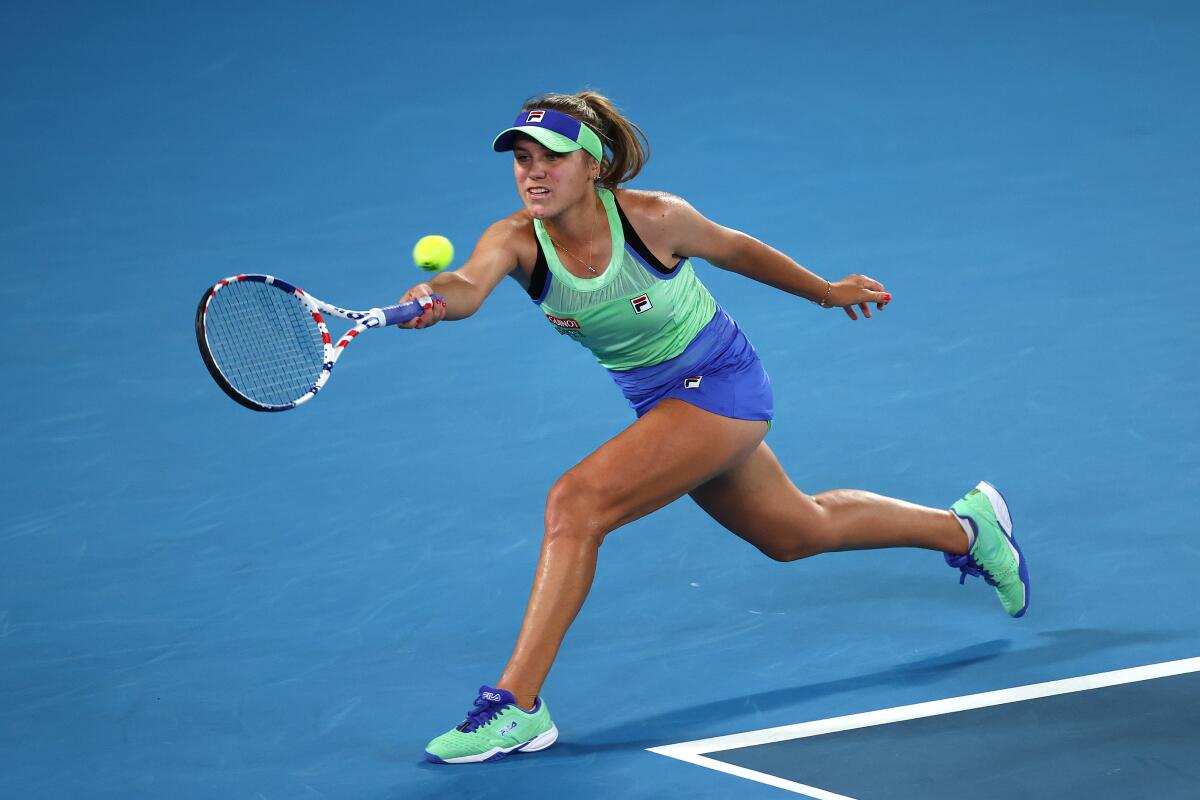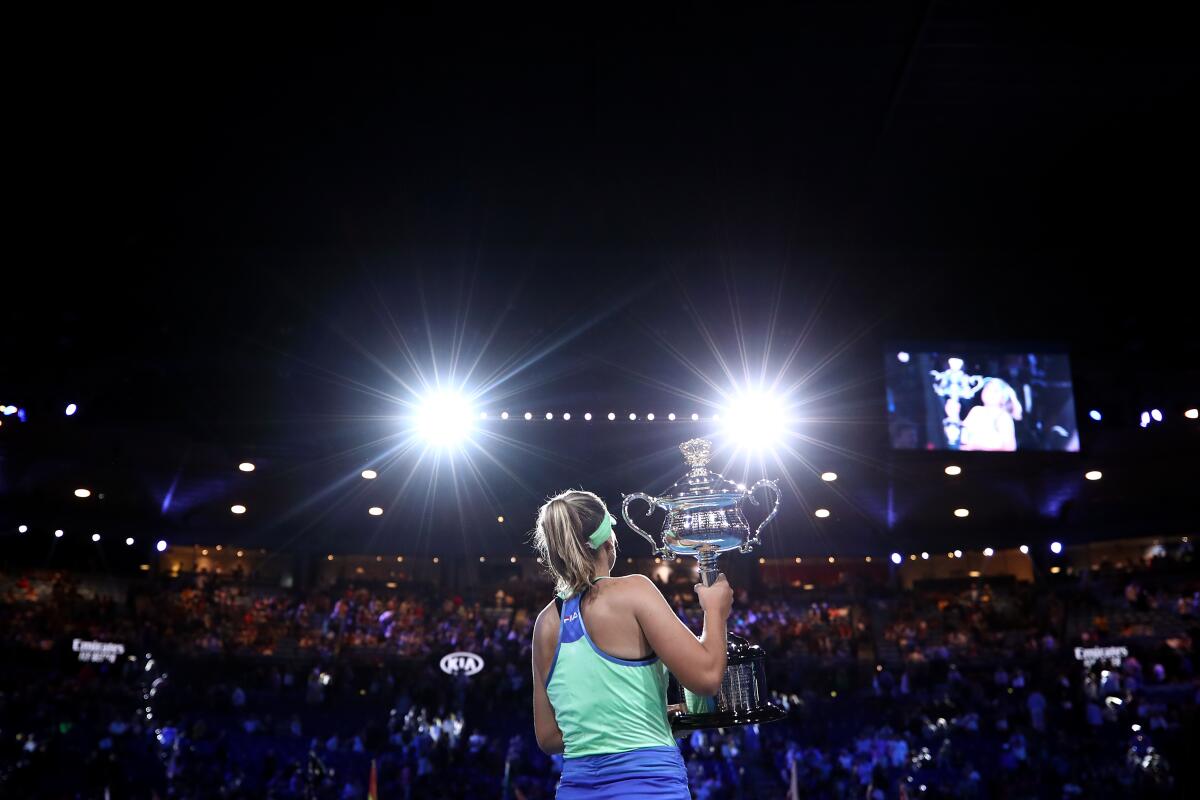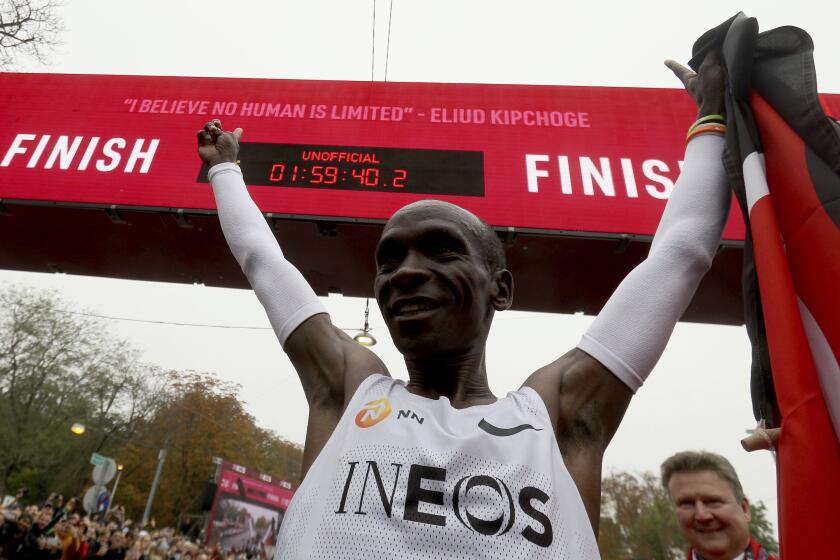American Sofia Kenin shines in crunch time to capture Australian Open title

- Share via
MELBOURNE, Australia — This, essentially, was where Sofia Kenin was going to win or lose the Australian Open final: She was down love-40 while serving at 2-all in the third set against two-time major champion Garbine Muguruza.
Kenin sensed this was the moment that would matter. Up in the stands of Rod Laver Arena, so did her father, Alex, who’s also her coach.
“I knew I had to take my chance,” Kenin said. “I had to be brave.”
She was. The 21-year-old American won the next five points, each with a winner — one an ace, the others clean groundstrokes to cap exchanges of 11 shots or more — and was on her way to becoming a Grand Slam champion.
Demonstrative as can be — whether spiking a ball, dropping her red-white-and-blue racket or slapping her thigh — and at her best when necessary, the 14th-seeded Kenin won the first major final of her career Saturday by coming back to beat a fading Muguruza 4-6, 6-2, 6-2 at Melbourne Park.
“That’s the game I feel, like, changed things. I had to play some [of my] best tennis. I did,” Kenin said. “After that, I was on fire. I was ready to take the beautiful trophy.”
Kenin was magnificent when it mattered the most, saving 10 of the 12 break points she faced on her own serve while converting five of six against Muguruza’s.
“I’m not very happy about my performance. At the important moments, I didn’t find my shots,” Muguruza said. “I think she found her shots. I didn’t.”
Track officials are banning high-tech shoes that some elite runners wear, particularly the specialized Nike prototype that was used during a race last fall.
Muguruza was visited by a trainer after the second set and her movement wasn’t ideal down the stretch. Neither was her serving: She double-faulted eight times, including three in the last game, one on championship point to finish the match.
“A little bit lack of energy,” Muguruza said.
Coming into the season, Kenin was ranked outside the top 50 and had yet to win a tour-level title and, at 5 feet 7, had been literally overshadowed by other young U.S. stars such as 15-year-old Coco Gauff and 18-year-old Amanda Anisimova.
But she defeated Gauff in the fourth round this week en route to becoming the youngest Australian Open champion since 2008, when Maria Sharapova won the hard-court tournament at age 20.
Kenin, who eliminated No. 1 Ash Barty in the semifinals, is expected to rise to No. 7 in Monday’s WTA rankings, the youngest American to crack the top 10 since Serena Williams in 1999.
“Those people that didn’t believe in her, they had very valid reasons not to, because she’s always been the smallest one,“ Alex Kenin said the day before the final. “But I guess, thank God, I saw something that they didn’t. Because I know her better. I feel pretty happy. I guess I was right.”

Highlights from Sofia Kenin’s victory over Garbine Muguruza in the Australian Open women’s singles final.
In the men’s final on Sunday, defending champion Novak Djokovic will face Dominic Thiem, a 26-year-old Austrian who was the runner-up to Rafael Nadal at the French Open the past two years. Djokovic seeks a record-extending eighth title at Melbourne Park and 17th major trophy overall; Thiem is trying to become the first man born in the 1990s to win a Grand Slam title.
Kenin was born in 1998 in Moscow to Russian parents who had already moved to New York and back once before she was born. When she was a few months old, they moved back to the U.S. for good and Kenin grew up in Florida and still makes her home there.
Muguruza came into the day with a far more formidable record. She has been ranked No. 1 and won the French Open in 2016 and Wimbledon in 2017 — the only woman to beat each Williams sister in a Grand Slam final.
But she tumbled out of the top 30 last season because of so-so results. She was trying to become only the third unseeded champion at the Australian Open in the professional era, which began in 1968.
Muguruza put on her game face from the moment she walked through the tunnel leading to the court. She didn’t even spare a smile for prematch photos up at the net with a grinning Kenin.
And when she made her first move in front, breaking to go up 2-1 after 15 minutes, Muguruza just tucked her racket under her left arm like an old-school commuter with a folded newspaper on the way to catch a subway train.
Kenin makes her mood obvious at all times.
After lost points, she bounced her racket or kicked it, rolled her eyes, muttered to herself. After winning points, she would pump a fist and scream “Come on!”
While Muguruza generally stuck to her preferred tactic of power groundstrokes and moving forward when an opening demanded it, Kenin put more shape and spin on balls, and won multiple points with drop shots.

Muguruza took the last two games of the opening set to move in front.
“I was obviously devastated,” Kenin would say later.
But that is where the match’s direction switched completely.
While Kenin’s level of play elevated, Muguruza’s plunged. Her serve percentage and speed dipped. Her footwork was problematic.
Kenin broke to go up 3-1 and again to force a third set.
That’s when Kenin stood her ground at that key juncture at 2-all in the third, holding there and then breaking immediately.
“A very important moment,“ Muguruza called it.
Well, there’s an understatement.
Soon enough, Kenin was kissing the trophy, just as her father had kissed her on the cheek right before the walk from the hallway outside the locker room to the court.
When Kenin entered the interview room for her postmatch news conference, she was handed a glass of bubbly. She’s barely old enough to drink legally back home.
Her mom stayed in Florida and awaited a phone call to find out about the match — too nervous to watch in person or on TV.
When it was time for Kenin’s on-court speech, Dad called her over for a bit of advice.
“He just told me a few things what to say,” Kenin said. “I told him, ‘I know what to say. I’m 21. I can do this.“’
What can’t she do right now?
More to Read
Go beyond the scoreboard
Get the latest on L.A.'s teams in the daily Sports Report newsletter.
You may occasionally receive promotional content from the Los Angeles Times.











